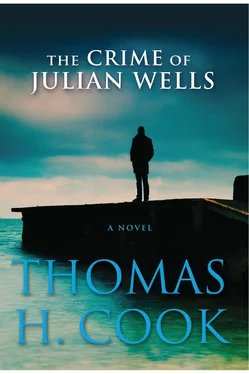Thomas Cook - The Crime of Julian Wells
Здесь есть возможность читать онлайн «Thomas Cook - The Crime of Julian Wells» весь текст электронной книги совершенно бесплатно (целиком полную версию без сокращений). В некоторых случаях можно слушать аудио, скачать через торрент в формате fb2 и присутствует краткое содержание. Год выпуска: 2012, ISBN: 2012, Издательство: Grove Press, Жанр: Криминальный детектив, на английском языке. Описание произведения, (предисловие) а так же отзывы посетителей доступны на портале библиотеки ЛибКат.
- Название:The Crime of Julian Wells
- Автор:
- Издательство:Grove Press
- Жанр:
- Год:2012
- ISBN:9780802194589
- Рейтинг книги:5 / 5. Голосов: 1
-
Избранное:Добавить в избранное
- Отзывы:
-
Ваша оценка:
- 100
- 1
- 2
- 3
- 4
- 5
The Crime of Julian Wells: краткое содержание, описание и аннотация
Предлагаем к чтению аннотацию, описание, краткое содержание или предисловие (зависит от того, что написал сам автор книги «The Crime of Julian Wells»). Если вы не нашли необходимую информацию о книге — напишите в комментариях, мы постараемся отыскать её.
The Crime of Julian Wells — читать онлайн бесплатно полную книгу (весь текст) целиком
Ниже представлен текст книги, разбитый по страницам. Система сохранения места последней прочитанной страницы, позволяет с удобством читать онлайн бесплатно книгу «The Crime of Julian Wells», без необходимости каждый раз заново искать на чём Вы остановились. Поставьте закладку, и сможете в любой момент перейти на страницу, на которой закончили чтение.
Интервал:
Закладка:
My father had never indicated such qualms about Julian’s work, so it had never occurred to me that he thought it so misdirected.
“In my opinion, it’s the good people who deserve to be written about,” he added softly.
This called into question the whole of Julian’s work, how relentlessly dark it had been. I recalled an article on bastinado he’d once written, the beating of the feet, its different names, falanga, falaka, where and when it had been practiced, and with what instruments. He’d even meticulously described the physical structure of the feet, the large number of small bones, the nerves that cluster in the soles, how painful it must be to suffer such assault.
My father shrugged. “But that was Julian,” he said in a way that made it clear he had no intention of dwelling further on the grim nature of his books. “So you’ll be going away.”
“For a little while,” I said. “But I’ll stay in touch. With Skype, we can even see each other. And if anything. . comes up, I can fly back in no time.”
“Of course,” my father said, though he was clearly reticent to see me go, feeling vulnerable as old people inevitably do.
“I have to do this, Dad,” I said.
My father smiled, then reached over and touched my hand. “I can see that,” he said. Something inexpressibly sad drifted into his eyes. “It’s a good thing to have a mission.”
I considered all the futile missions my father had undertaken. He’d worked for fresh water in lands ravaged by cholera, for regional clinics in jungle redoubts, for irrigation in regions made barren by drought. In every case, as he’d long ago admitted, he’d been thwarted by the “big picture” at the State Department, global strategies of containment, domino theories, the specter of mutually assured destruction.
“Yes,” I said, then changed the subject, and for the next hour or so we talked of old films he’d watched on television lately. In addition to Westerns and spy movies, he’d begun to watch the noir movies of the forties, Humphrey Bogart and Alan Ladd, and when he spoke of them I could hear a strange longing in his voice, his old desire to be a man of action still pursuing him and accusing him and tainting his memory with failure.
“Do you want to watch a movie?” I asked in hopes of stopping the downward slant of his mood.
“No,” my father answered. He seemed to go deep inside himself, then return slowly, like a diver resurfacing. “It’s the dusty people, Philip, too small for us to notice,” he said, “the little dusty people who bear the brunt of our mistakes.”
His mood was quite obviously descending, so I gently urged him toward his youth, and for the next few minutes he talked rather nostalgically about his own father, then his college years, then about my mother, who, like my own wife, had died before her time.
“You should be getting home now,” he said at last. “I could go on for hours.”
“Yes, I probably should,” I said.
My father looked like one who’d once been offered a mission not unlike my own, but had either refused it or failed to achieve it. “Good luck,” was all he said.
7
There is no substitute for meaning, and the luckiest of us are those who have felt the spur of a grave commitment. I couldn’t possibly include myself among the men who hung in dark frames from the walls of my father’s apartment. They had been warriors and diplomats, and a few, as my father had once reluctantly admitted, had been spies. I knew that my own life would never be as charged with mission as theirs. Even so, that map of Argentina, the grim fact of Marisol’s disappearance, and finally Julian’s curious mention of some crime I had witnessed- his crime-had joined together to provide a purpose to my going to Paris that was larger than any I had known in a long time.
This purpose was still in my mind when I got back to my apartment.
I poured a glass of brandy, took my usual seat at the window, and looked out over the park, a glance into the night that loosened the bonds of recollection, and took me back to Berlin with Julian more than twenty years before.
He’d gone there in an effort to track down and interview some of the surviving German soldiers who had massacred the villagers of Oradour-sur-Glane in June of 1944. He had decided to write an account of this atrocity, and on the train from Paris to Berlin, he’d gone through its terrible details.
He was twenty-seven at the time, and although we had regularly exchanged letters, it had been well over a year since I’d seen him. By then, a certain texture had been added to him by his travels and his studies, and his voice bore a gravity that I associated with the knowledge and experiences he had accumulated since last we’d met.
“So, how is the new book coming?” I asked him.
“Oradour is hard to write about,” he said.
His eyes were still blue, but their shade seemed deeper, though I doubt their color had actually changed. Still, there was an incontestable depth in those eyes, something that spoke of the charred village whose tragedy he had chosen as the subject of his next book.
“Yes, it was terrible what happened at Oradour,” I said.
“I don’t mean that it’s hard to write about in that way,” Julian said. “It’s that there’s a kind of voyeurism involved, a peep-show quality.”
I looked at him, puzzled, and at that instant, the train entered a tunnel that threw us into shadow, so that we sat in silence, rumbling on, until the train passed out of the darkness and we were bathed in light again.
Something in Julian’s face had changed. It was as if, during the brief darkness of the tunnel, some other, deeper darkness had fallen upon him.
“The pain of others should not be made thrilling,” he said softly. “There should be no intellectual sadism in reading about Oradour.”
Had that been the moment when it first occurred to him to write his book as he’d later written it? I wondered now.
One thing was clear: In The Eyes of Oradour, Julian had focused exclusively on the victims, all 642 of them, each given a single page to bear witness, a kind of Spoon River Anthology for the members of that murdered village. That was the magisterial oddity of the book, the way Julian had managed to see the massacre through the eyes of those who’d suffered it. To write of the atrocity at Oradour in so strange a way had been a brave choice, and at times-when a little girl used her own body to shield her doll from the attack, for example-he had brought a heartrending vividness to the victims’ deaths.
But in that same narrative, he’d refused to name either the men who ordered the massacre or those who carried it out. Even as unnamed figures, the Germans are glimpsed only at quick moments when the crowd breaks and the back of a soldier, or perhaps only a boot or uniformed leg, is glimpsed in what amounts to a photo flash. At other times the soldiers are disembodied voices, shouting commands or gently deceiving the villagers of Oradour as to their real intent. In other instances, they appear only as the blurry hint of a figure, a brushstroke of helmeted gray.
On the whole, I thought the book extraordinarily accomplished, worthy of the many years it had taken Julian to write it, though a few reviewers had complained that he had concealed the methodical human agency behind the massacre too much, making the innocent of Oradour seem less like the victims of actual cruelty than of the touching down of a storm.
At the time, even though I greatly admired the book, I also thought this criticism not altogether unfair. It was a monumental crime, after all, and Julian had determinedly concealed the men who had carried it out.
Why had he done that?
Читать дальшеИнтервал:
Закладка:
Похожие книги на «The Crime of Julian Wells»
Представляем Вашему вниманию похожие книги на «The Crime of Julian Wells» списком для выбора. Мы отобрали схожую по названию и смыслу литературу в надежде предоставить читателям больше вариантов отыскать новые, интересные, ещё непрочитанные произведения.
Обсуждение, отзывы о книге «The Crime of Julian Wells» и просто собственные мнения читателей. Оставьте ваши комментарии, напишите, что Вы думаете о произведении, его смысле или главных героях. Укажите что конкретно понравилось, а что нет, и почему Вы так считаете.












